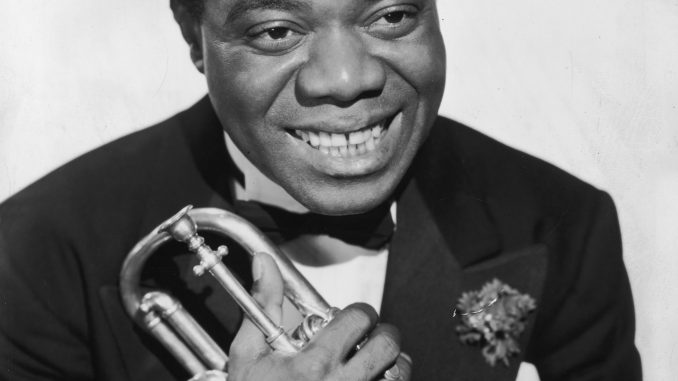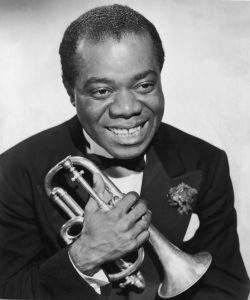

Louis Armstrong (August 4, 1901 – July 6, 1971) was a highly influential American jazz trumpeter and vocalist from New Orleans, known for shifting jazz from collective improvisation to solo performance. Despite a difficult childhood, he learned to play the cornet at a home for troubled boys and became a star by the 1920s through his virtuosic trumpet playing, innovative scat singing, and famous Hot Five and Hot Seven recordings. His career spanned five decades, and he became an international celebrity who also appeared in films.
Early life and education
- Born in New Orleans, Armstrong grew up in poverty in a neighborhood called “The Battlefield”.
- He left school after fifth grade to work odd jobs, including for the Karnofsky family, who helped him buy his first cornet.
- After a 1912 arrest for firing a pistol on New Year’s Eve, he was sent to the Colored Waif’s Home for Boys.
- At the home, he was taught to play the cornet by Peter Davis and eventually became the leader of the school’s brass band, a turning point in his life.
Musical career and rise to fame
- He began his professional career playing on Mississippi riverboats and in New Orleans bands.
- In 1922, he moved to Chicago to join his mentor, King Oliver’s Creole Jazz Band.
- His reputation grew, and he later joined the Fletcher Henderson Orchestra in New York City.
- Armstrong’s career took off in the mid-1920s when he began recording under his own name with the Hot Five and Hot Seven ensembles.
- These recordings marked a major shift in jazz by highlighting his incredible talent as a soloist and vocalist, establishing the preeminence of the virtuoso soloist.
- He also popularized scat singing, using his voice to improvise nonsense syllables like an instrument.
- By 1929, he was famous, touring the world and performing popular songs in addition to jazz.
Later career and legacy
- His career expanded to include roles in film and television, making him a global star and “Ambassador Satch”.
- Some of his most famous songs include “What a Wonderful World,” “Hello, Dolly!,” and “La Vie en Rose”.
- Armstrong’s infectious personality and innovative musical style profoundly influenced generations of musicians.
- He died on July 6, 1971, from a heart attack, after years of battling heart and kidney problems.
- He began his professional career playing on Mississippi riverboats and in New Orleans bands.
Leave a Reply